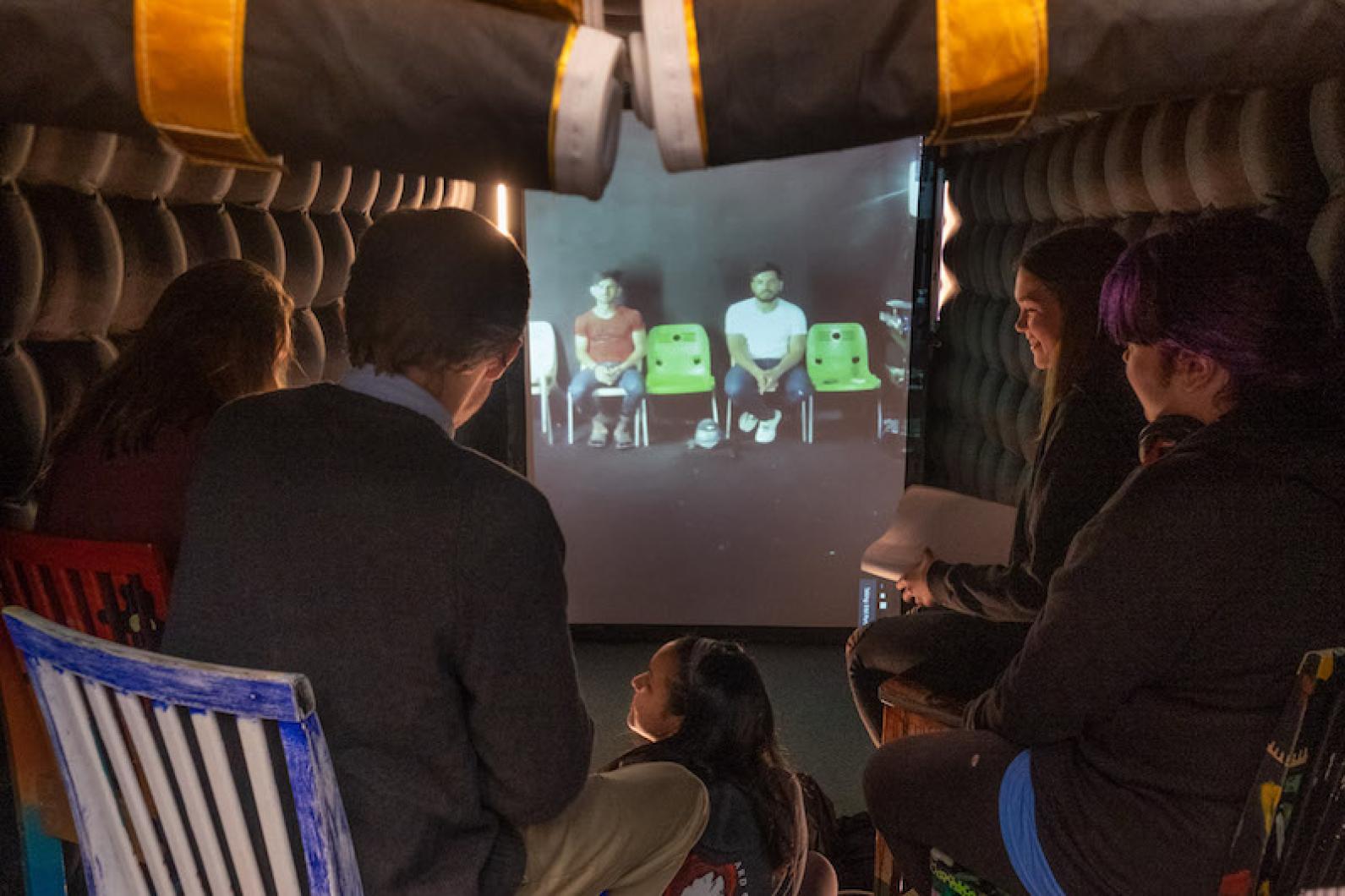On Wednesday morning, regional high school students crowded into a metallic orange tent the size of a moving truck set up in the library. Inside the tent a group of Iraqi teenagers from the northern city of Erbil appeared by video projection on the back wall. By design, it was as if the two groups were sitting across from each other in the same room.
The young Iraqi men wore sneakers and T-shirts. One wore a backwards baseball cap. Another held an iPhone. They asked how old the Vineyard students were. Laughing, they talked about their favorite foods and asked about going to school in America.
Interpreter and organizer Rami Khalaf translated the conversation.
The experience was part of a project called Cross Cultural Perceptions versus Reality, spearheaded by high school librarian Kevin McGrath. With funding from the Massachusetts Foundation for the Humanities, Mr. McGrath brought the portal, a product of Shared Studios, to the high school library. The portal was up for three days, and students spoke with young people from around the world including Iraq, Nigeria, Sweden and Afghanistan.
As the students spoke to each other there was little indication that the young Iraqi men were broadcasting from a refugee camp, home to hundreds of families who left Mosul and surrounding areas to escape the threat of the Islamic State. Rather, front and center was the quotidian experience of being a young person. How early did you have to wake up today? Do you like soccer?
Portal curator CJ Morse, who travels with the project, said that is exactly how it should be.
“If you were on the run for five years, would you want to talk about the running you’ve done? Or would you want to talk about the things you’ve missed?” he asked. “We connect with places like Gaza and even there the conversation goes everywhere. I’ve had kids talk about how much they love Ed Sheeran. I’ve had kids talk about their love of robotics and other countries.”
The portal was set up for three days this week, a test run for Mr. McGrath, who plans to bring the immersive experience back next fall for more in-depth coursework on cross-cultural conversations with an emphasis on the experience of refugees and immigrants.
Mr. McGrath recounted an impromptu conversation with two Nigerian women on Tuesday morning during which everyone’s horoscopes were read. The group discovered that Mr. McGrath and one of the Nigerian women shared a birthday.
“We were like, that’s crazy! Oh my God! So we were exchanging our emails and stuff,” he said. “And she had read my horoscope and it was right on.”
The women also shared a traditional song about a Nigerian folk tale.
“We were talking about how they have this oral culture and they share stories. Everyone knows that story in Nigeria,” Mr. McGrath said of conversations with students afterwards. “We don’t really tell stories that way.”
Regional high school junior Lola Northrop is from Germany and has lived in New York and Berlin before moving to the Vineyard. During the week she talked with many people in the portal.
“I am an international person, but I’ve never been to Afghanistan or Nigeria or Sweden,” she said. She said her most interesting conversation was with young men from Afghanistan talking about women’s rights there and their religious beliefs.
After emerging from the tent, the group of six Vineyard students who spoke with the young men in Iraq said the experience upended some of their expectations.
“People have their thoughts about what it’s like there, but it’s completely different than most people say it is,” said Hannah Rabasca.
“It’s about human connection,” Mr. Morse said. “If this is going to be one of the few conversations you’re going to have with somebody outside the country, then do it. Say what you want to say. See what happens.”




Comments
Comment policy »